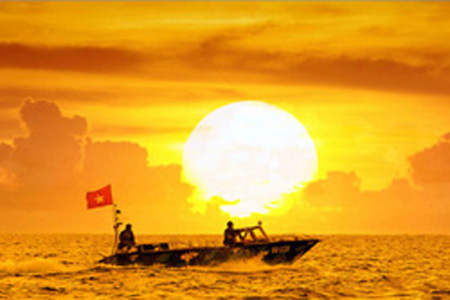Strolling along the tree-lined Phan Dinh Phung Avenue, a tourist passing by the northern wall of the ancient citadel of Hanoi can see a gaping hole left by the shells from a French gunboat in 1873, the year which saw the first fall of the fortress to the French colonial onslaught. Nine years later, it was occupied for good. The governor of Hanoi, Hoang Dieu, had taken his own life.
In his hook “L’Annam sanglant” (Blood Drenched Annam) an Indochinese novelist, Albert de Pouvourville (alias Mat Gioi, or Sun), evokes that tragic episode of Vietnamese history: His novel is bathed in the atmosphere of cheap exotism common in the colonial literature of the time, with the all-too familiar clichés: courage and generosity of the conqueror, perversity and subtle Asiatic cruelty, blood-letting, sensual pleasure, and opium. The Vietnamese commander Hoang Dieu is depicted as a coward: “He was fearful of war, as a true sage and an egoist longing for peace”. He was forced to commit suicide by hanging by the Chinese chief of the Black Flags sent to the rescue the Vietnam court. This was aimed at fanning the hatred felt by the Vietnamese people and encouraging them in the struggle against the ‘Tay” (Western people, i.e. the French).
All that is pure fiction. Historical facts are shown in a writing by Hoang Dieu himself and a popular song paying tribute to him.
A doctor of humanities, Hoang Dieu was appointed governor of Ha Ninh (Hanoi and Ninh Binh) in 1880. In 1882, as soon as he arrived in Hanoi, he saw through the design of the French and asked the court to organize the defense of the country. King Tu Duc blamed him for this, accusing him of recommending an “ill-timed defense”. Early in 1882, Henri Riviire’s gunboats cast anchor on the Red River flowing before Hanoi. Pretending to be faced with “war preparations on the part of the Vietnamese”, Riviere sent an ultimatum to Hoang Dieu, demanding that the defense works be dismantled and the Vietnamese forces withdrawn.
Then without waiting for an answer he launched an attack. Before taking his own life in the grounds of the Military Temple, he wrote a petition to the king.
“Although no military expert, I have been entrusted with heavy responsibilities. Born and trained as a scholar, I am ignorant of frontier problems. If Hanoi were to fall the other provinces would drop like ripe fruits. Seized with anguish, I sent a pressing appeal to other regions and alerted the Court… Alas, for this His Majesty blamed me… This sanction seemed to me too severe…” Hoang Dieu attempted to do what was impossible: “Every day I consulted my colleagues. Some suggested that the gates be opened to the enemy. Others proposed a troop withdrawal to calm his suspicions. But were my body to be quartered and my bones crushed I could not resign myself to those measures”.
“The French stepped up their attacks… Overcoming my illness I rushed out at the head of a column of troops. We killed about a hundred enemy troops and held out half a day. But they were at full strength and we were exhausted. No reinforcements came: we Were lost. The panic-stricken military showed a clean pair of heels.
Broken hearted, what could I do single-handed? Unable to command, I felt myself unworthy of living. Having lost the citadel, I could not be redeemed through death”.
In an anonymous poem composed a few months after that event and circulated by word of mouth, entitled: “The Breath of Uprightness in the Capital”, the people sang the praise of Hoang Dieu, the symbol of uprightness and patriotism:
“With iron courage
And a heart the color of cinnabar
In order to clear himself of all suspicions
Born of the cruel defeat
And demonstrate his loyalty to the king
He chose to entrust to the branch of a tree
His exhausted spirit”.



